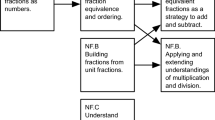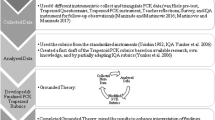Abstract
The purpose of the project reported in this article was to evaluate how assessing teachers’ mathematical knowledge within a professional development course impacted from the teachers’ perspective their learning and their experience with the course. The professional development course consisted of a 2-week summer institute and the content focus was geometry. We had decided to assess the mathematical learning of the teachers during this professional development course for various accountability reasons, but were concerned about possible negative by-products of this decision on the teachers and their participation. Thus, we worked to design assessment in ways that we hoped would minimize negative impacts and maintain a supportive learning environment. In addition, we undertook this evaluation to examine the impacts of the assessment, which included homework, quizzes, various projects, and an examination for program evaluation. Seventeen grade 5–9 teachers enrolled in the course participated in the study by completing written reflections and by describing their experiences in interviews. We learned that while our original intent was “to do no harm,” the teachers reported that their learning was enhanced by the assessment. The article concludes by describing the various properties of the assessments that the teachers identified as contributing to their learning of the geometry content, many of which align with current recommendations for assessing and evaluating grade K-16 mathematics students.



Similar content being viewed by others
Notes
Cathy is a pseudonym, as are all the teachers’ names.
The teachers’ grades were not calculated or posted until 3 weeks after the completion of the 2-week institute. Thus, no data was collected with regard to how the teachers felt with respect to their final grades.
References
Askov, E. N., Van Horn, B. L., & Carman, P. S. (1997). Assessment in adult basic education programs. In A. D. Rose & M. A. Leahy (Eds.), Assessing adult learning in diverse settings: Current issues and approaches: Vol. 75. New directions for adult and continuing education (pp. 65–74). San Francisco, CA: Jossey-Bass Publishers.
Ball, D. L. (1991). Teaching mathematics for understanding: What do teachers need to know about subject matter? In M. Kennedy (Ed.), Teaching academic subjects to diverse learning (pp. 63–83). New York: Teachers College Press.
Ball, D. L., & Bass, H. (2003). Toward a practice-based theory of mathematical knowledge for teaching. In B. Davis & E. Simmt (Eds.), Proceedings of the 2002 annual meeting of the Canadian mathematics education study group (pp. 3–14). Edmonton, AB: SMESG/GCEDM.
Basista, B., & Mathews, S. (2002). Integrated science and mathematics professional development programs. School Science and Mathematics, 102(7), 359–370.
Black, P., & Wiliam, D. (1998). Inside the black box: Raising standards through classroom assessment. Phi Delta Kappan, 80(2), 139–148.
Campbell, P. F., & White, D. Y. (1997). Project IMPACT: Influencing and supporting teacher change in predominantly minority schools. In E. Fennema & B. S. Nelson (Eds.), Mathematics teachers in transition (pp. 309–355). Mahwah, NJ: Lawrence Erlbaum Associates.
Colorado Department of Education. (2005). Colorado model content standards: Mathematics. Denver, CO: Author.
Cooney, T., Badger, E., & Wilson, M. (1993). Assessment, understanding mathematics, and distinguishing visions from irages. In N. Webb (Ed.), Assessment in the mathematics classroom (1993 Yearbook, pp. 239–247). Reston, VA: NCTM.
Cumming, J., & Gal, I. (2000). Assessment in adult numeracy education: Issues and principles for good practice. In I. Gal (Ed.), Adult numeracy development: Theory, research, practice (pp. 305–333). Cresskill, NJ: Hampton Press, Inc.
Delaney, S., Ball, D. L., Hill, H. C., Schilling, S. G., & Zopf, D. (2008). “Mathematical knowledge for teaching”: Adapting U.S. measures for use in Ireland. Journal of Mathematics Teacher Education, 11, 171–197.
Farmer, J., Gerretson, H., & Lassak, M. (2003). What teachers take from professional development: Cases and implications. Journal of Mathematics Teacher Education, 6(4), 331–360.
Farr, B. P. (2000). Grading practices: An overview of the issues. In E. Trumbull & B. Farr (Eds.), Grading and reporting student progress in an age of standards (pp. 1–22). Norwood, MA: Christopher-Gordon Publishers.
Garet, M. S., Porter, A. C., Desimone, L., Birman, B. F., & Yoon, K. S. (2001). What makes professional development effective? Results from a national sample of teachers. American Educational Research Journal, 38(4), 915–945.
Gay, D. (1998). Geometry by discovery. New York: John Wiley and Sons, Inc.
Ginsburg, L., & Gal, I. (2000). Instructional strategies for adult numeracy education. In I. Gal (Ed.), Adult numeracy development: Theory, research, practice (pp. 89–132). Cresskill, NJ: Hampton Press, Inc.
Gipps, C. V. (1994). Beyond testing: Towards a theory of educational assessment. Washington, DC: The Falmer Press.
Guskey, T. R., & Bailey, J. M. (2001). Developing grading and reporting systems for student learning. Thousand Oaks, CA: Sage.
Hargis, C. H. (1990). Grades and grading practices: Obstacles to improving education and to helping at-risk students. Springfield, IL: Charles C. Thomas Publisher.
Hauk, S., Deon, R., Judd, A. B., Kreps, J., & Novak, J. (2006). No teacher left behind: Pedagogical content knowledge and mathematics teacher professional development. Manuscript submitted for publication.
Hill, H. C., & Ball, D. L. (2004). Learning mathematics for teaching: Results from California’s mathematics professional development institutes. Journal for Research in Mathematics Education, 35(5), 330–351.
Hill, H. C., Rowan, B., & Ball, D. L. (2005). Effects of teachers’ mathematical knowledge for teaching on student achievement. American Educational Research Journal, 42(2), 371–406.
Hill, H. C., Schilling, S. G., & Ball, D. L. (2004). Developing measures of teachers’ mathematics knowledge for teaching. The Elementary School Journal, 105(1), 11–30.
Hill, H. C., Sleep, L., Lewis, J. M., & Ball, D. L. (2007). Assessing teachers’ mathematical knowledge: What knowledge matters and what evidence counts? In F. K. Lester Jr (Ed.), Second handbook of research on mathematics teaching and learning (pp. 111–156). Charlotte, NC: Information Age Publishing.
Kasworm, C. E., & Marienau, C. A. (1997). Principles for assessment of adult learning. In A. D. Rose & M. A. Leahy (Eds.), Assessing adult learning in diverse settings: Current issues and approaches: Vol. 75. New directions for adult and continuing education (pp. 5–16). San Francisco, CA: Jossey-Ball Publishers.
Kilpatrick, J., & Silver, E. A. (2000). Unfinished business: Challenges for mathematics educators in the next decades. In M. J. Burke & F. R. Curcio (Eds.), Learning mathematics for a new century (2000 Yearbook, pp. 223–236). Reston, VA: National Council of Teachers of Mathematics.
Kohn, A. (1993). Punished by rewards: The trouble with gold stars, incentive plans, A’s, praise, and other bribes. New York: Houghton Mifflin Company.
Lappan, G. (2000). A vision of learning to teach for the 21st century. School Science and Mathematics, 100(6), 319–326.
Loucks-Horsley, S., Hewson, P. W., Love, N., & Stiles, K. (1998). Designing professional development for teachers of science and mathematics. Thousand Oaks, CA: Corwin Press.
Loucks-Horsley, S., & Matsumoto, C. (1999). Research on professional development for teachers of mathematics and science: The state of the scene. School Science and Mathematics, 99(5), 258–271.
Ma, L. (1999). Knowing and teaching elementary mathematics: Teachers’ understanding of fundamental mathematics in China and the United States. Mahwah, NJ: Lawrence Erlbaum Associates.
Mathematical Sciences Education Board. (1993). Measuring what counts: A conceptual guide for mathematics assessment. Washington, DC: National Academy Press.
META Associates. (2006). Year 2 evaluation report: January 1, 2005–December 31, 2005. Northeast Front Range Math/Science Partnership (MSP) to increase teacher competence in content. Unpublished manuscript.
National Council of Teachers of Mathematics. (1995). Assessment standards for school mathematics. Reston, VA: Author.
National Council of Teachers of Mathematics. (2000). Principles and standards for school mathematics. Reston, VA: Author.
National Council of Teachers of Mathematics. (2003). A research companion to principles and standards for school mathematics. Reston, VA: Author.
National Forum on Assessment. (1995). Principles and indicators for student assessment systems. Cambridge, MA: FairTest.
OMNI. (2006). Report on math assessment data: Math and science partnerships summer institutes 2005. Unpublished manuscript.
Patton, M. Q. (1990). Qualitative evaluation and research methods. Newbury Park, CA: SAGE Publications.
Public Education Network in collaboration with the National Coalition for Parental Involvement in Education. (2003). NCLB action briefs. Washington, DC: Public Education Network. ED 481 483.
Saxe, G. B., Gearhart, M., & Suad Nasir, N. (2001). Enhancing students’ understanding of mathematics: A study of three contrasting approaches to professional support. Journal of Mathematics Teacher Education, 4(1), 55–79.
Schifter, D. (1998). Learning mathematics for teaching: From a teachers’ seminar to the classroom. Journal of Mathematics Teacher Education, 1(1), 55–87.
Shindler, J. V. (2004). “Greater than the sum of the parts?” Examining the soundness of collaborative exams in teacher education courses. Innovative Higher Education, 28(4), 273–283.
Shulman, L. S. (1986). Those who understand: Knowledge growth in teaching. Educational Researcher, 15(2), 4–14.
Shulman, L. S. (1987). Knowledge and teaching: Foundations of the new reform. Harvard Educational Review, 57, 1–22.
Strauss, A. L., & Corbin, J. (1998). Basics of qualitative research: Techniques and procedures for developing grounded theory (2nd ed.). Thousand Oaks, CA: SAGE Publications.
Strickland, K., & Strickland, J. (1998). Reflections on assessment: Its purposes, methods, and effects on learning. Portsmouth, NH: Boynton/Cook Publishers Inc.
Swafford, J. O., Jones, G. A., & Thornton, C. A. (1997). Increased knowledge in geometry and instructional practice. Journal for Research in Mathematics Education, 28(4), 467–483.
Swan, M. (1993). Assessing a wider range of students’ abilities. In N. L. Webb & A. F. Coxford (Eds.), Assessment in the mathematics classroom: 1993 yearbook of the National Council of Teachers of Mathematics (pp. 26–39). Reston, VA: National Council of Teachers of Mathematics.
Tirosh, D., & Graeber, A. (2003). Challenging and changing mathematics teaching classroom practices. In A. J. Bishop, M. A. Clements, C. Keitel, J. Kilpatrick & F. K. S. Leung (Eds.), Second international handbook of mathematics education (pp. 643–688). Boston, MA: Kluwer Academic Publishers.
Trumbull, E. (2000). Why do we grade—and should we? In E. Trumbull & B. Farr (Eds.), Grading and reporting student progress in an age of standards (pp. 23–44). Norwood, MA: Christopher-Gordon Publishers.
U.S. Department of Education, Office of the Under Secretary. (2003). No child left behind: A toolkit for teachers. Washington, DC: Education Publications Center, U.S. Department of Education. ED 480 850.
Wilson, L. D., & Kenney, P. A. (2003). Classroom and large-scale assessment. In J. Kilpatrick, W. G. Martin & D. Schifter (Eds.), A research companion to principles and standards for school mathematics (pp. 53–67). Reston, VA: National Council of Teachers of Mathematics.
Wilson, S. M., Shulman, L. S., & Richert, A. (1987). 150 different ways of knowing: Representations of knowledge in teaching. In J. Calderhead (Ed.), Exploring teachers’ thinking (pp. 104–124). Sussex: Holt, Rinehart, and Winston.
Yackel, E., & Cobb, P. (1996). Socio-mathematical norms, argumentation, and autonomy in mathematics. Journal for Research in Mathematics Education, 27, 458–477.
Zaslavsky, O., Chapman, O., & Leikin, R. (2003). Professional development in mathematics education: Trends and tasks. In A. J. Bishop, M. A. Clements, C. Keitel, J. Kilpatrick & F. K. S. Leung (Eds.), Second international handbook of mathematics education (pp. 877–918). Boston, MA: Kluwer Academic Publishers.
Acknowledgment
The authors would like to thank Dr. Andrew Neumann for assisting in data collection and early analysis and Dr. Robert Powers for reading earlier drafts of this article and providing feedback. In addition, we want to thank the reviewers of the article and Dina Tirosh. Their comments greatly assisted with making the article more streamlined and with highlighting the important results from the project. The professional development studied here was supported by the High Plains Mathematics and Science Partnership Project funded by the Colorado Department of Education and by the Mathematics and Science Teaching Institute at the University of Northern Colorado. Research activity was also supported by the Center for Learning and Teaching in the West, an NSF-funded initiative.
Author information
Authors and Affiliations
Corresponding author
Rights and permissions
About this article
Cite this article
Chamberlin, M.T., Farmer, J.D. & Novak, J.D. Teachers’ perceptions of assessments of their mathematical knowledge in a professional development course. J Math Teacher Educ 11, 435–457 (2008). https://doi.org/10.1007/s10857-008-9088-6
Received:
Accepted:
Published:
Issue Date:
DOI: https://doi.org/10.1007/s10857-008-9088-6




